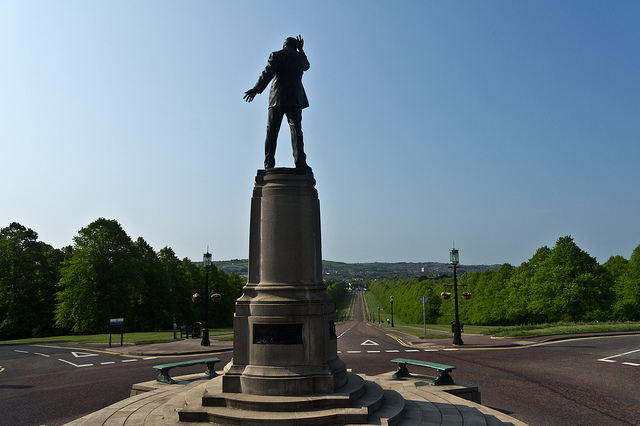A Northern Ireland ‘border poll’ could help pave a path of peace
The Scottish independence referendum showed the potential of direct democracy to engage and motivate citizens, particularly if what is at stake if the future of the country. Amy Maguire argues that Northern Ireland should follow their lead, and urges the Secretary of State for Northern Ireland to call a ‘border poll’ on the unification of Ireland, which has the potential to reconcile former foes, and marry justice with peace in post conflict-Ireland.

Credit: William Murphy, CC BY 2.0
In the wake of the Scottish referendum, Martin McGuinness, the deputy first minister of Northern Ireland, renewed his party Sinn Féin’s call for a “border poll” to decide if Northern Ireland should leave the UK and unify with the Republic of Ireland.
Such a vote appears likely to result in a No vote, but might nevertheless provide an opportunity for the people of Northern Ireland to feel ownership of their progress away from conflict and towards peace.
For McGuinness, the Scottish independence referendum “showed that it is possible to discuss important constitutional issues in a spirit of respect for all sides”. His view is not shared by the first minister, Peter Robinson, though. Robinson, a member of the Democratic Unionist Party, argues that a poll is unnecessary because “more and more people in Northern Ireland want to maintain the status quo” .
The leaders are, nevertheless, planning to meet soon with their Scottish and Welsh counterparts to discuss their shared interest in the expansion of devolution from Westminster.
A Belfast Telegraph poll conducted a week after the Scottish referendum claimed a majority of voters in Northern Ireland wanted a border poll. But it also showed that if one were to take place, 59.8% would vote against unifying with the Republic of Ireland. The results suggest that a nuanced constitutional debate is possible in Northern Ireland – a possibility that has not yet been fully harnessed by political leaders.
The campaign around the Scottish independence referendum brought energy to political debates in the UK and Ireland, while attracting international commentary as a victory for participative and deliberative democracy. Political leaders in the UK and Ireland ought to seize upon that momentum and use it to transform their relationships with citizens.
As University of Edinburgh professor Christine Bell has suggested, the hope for those beyond Westminster “must be for a new and more creative engagement between centre and periphery on constitutional development”. Indeed, the UK now finds itself at the beginning of a debate about devolving greater powers to Scotland, Wales and Northern Ireland.
Peace and justice
Under international law, every state is obliged to ensure that its people are free to exercise the universal right of self-determination. States are entitled to territorial integrity only to the extent that they empower their citizens to achieve self-determination.
A one-off exercise of self-determination, such as through a referendum on independence, is not enough to demonstrate a state’s respect for that right. Self-determination is an ongoing process, which ought to enable people to continually assess the degree to which they are free to determine their political, social, economic and cultural destiny.
The Irish peace process has enabled a shift from violent conflict to political conflict, played out largely through democratic institutions. But the perception that peace has been achieved belies the fact that the “meta-conflict” remains unresolved. Progress has been towards “war by other means”, a continuing debate over the conflict and the status of Northern Ireland. The collective human right of self-determination remains a missing piece in the puzzle.
Self-determination is a right heavily associated with the decolonisation period of the 1960s and 1970s but perhaps the time is ripe for the discussion to be re-opened, now that Scotland’s debate has captured so many imaginations.
The Good Friday/Belfast Agreement has made a significant contribution to shifting the conflict into a peaceful phase but has been less effective in promoting a peace that is grounded in justice. Some have even argued that the people of Northern Ireland must choose between peace and justice. Some argue that prosecuting political leaders for past crimes poses too great a risk to social stability to be pursued.
The path to justice in post-conflict societies is complicated by the need to reconcile the past with current and future goals, including an acknowledgement of past wrongs. But it is still possible – and worthwhile – to pursue both justice and peace in Northern Ireland.
An effective process of transitional justice can acknowledge colonialism and its impacts in Ireland and promote self-determination. Such a process would necessarily focus on truth-telling and dealing with the past. Citizens and political leaders would need to address their communal moral duty to recognise the position of the many people who still carry hurt from the conflict. Effective transitional justice would require all parties, including the British state, to confront their roles in the conflict and their aspirations for the peace.
A border poll for Northern Ireland could provide people with a similar sense of ownership of the deliberative process as the people of Scotland have recently embraced. The secretary of state for Northern Ireland has the power to call such a referendum under the Good Friday/Belfast Agreement. In considering whether or not to go ahead, Theresa Villiers will need to question McGuinness’ assertion that Northern Ireland can embrace such a deliberative process “in a spirit of respect for all sides”.
—
Note: This article was originally published on The Conversation. It represents the views of the author and not those of Democratic Audit or the LSE. Please read our comments policy before posting. ![]()
—
 Amy Maguire is Lecturer in International Law at University of Newcastle, Australia
Amy Maguire is Lecturer in International Law at University of Newcastle, Australia





 Democratic Audit's core funding is provided by the Joseph Rowntree Charitable Trust. Additional funding is provided by the London School of Economics.
Democratic Audit's core funding is provided by the Joseph Rowntree Charitable Trust. Additional funding is provided by the London School of Economics.
A Northern Ireland ‘border poll’ could help pave a path of peace https://t.co/G9tSZw8amo
A Northern Ireland ‘border poll’ could help pave a path of peace https://t.co/RcI6Pf66KZ